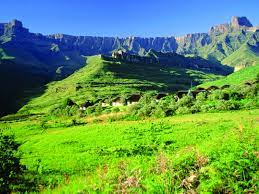
The Maloti-Drakensberg range in the Free State has been earmarked for a research project aimed at understanding the ecological drivers of range-expanding plant species at high altitudes.
“The deepening effects of climate change on the environment have had devastating consequences for communities in recent months, with changing weather patterns giving rise to major floods and droughts globally,” the Department of Science and Innovation (DSI) said on Friday.
To mitigate such impacts, the department said countries are increasingly pooling resources and collaborating on initiatives such as the Maloti-Drakensburg range research project.
The initiative was officially launched on Tuesday, 19 October 2021, with a site visit to the summit of the Maloti-Drakensberg.
“Here, at 3 100 metres above sea level, the researchers will seek to determine whether typical range-expanding species might colonise the alpine zone above 2 800 metres under simulated warmer conditions such as might exist in the not-too-distant future.”
Titled "RangeX", the project is being undertaken by a multi-institutional research consortium under the Mountain Invasive Research Network (MIREN), with Switzerland leading the research.
In addition, the DSI is funding South Africa's participation, which is being led by the Afromontane Research Unit (ARU) based at the University of the Free State's Qwaqwa Campus.
The research leader, Dr Vincent Clark, explained that little is known about the alpine zone in the Maloti-Drakensburg.
"We could be 100 years behind Switzerland with alpine research, in terms of what we know about the ecosystem. Yet, this system is critical for water security for two countries, Lesotho and South Africa," Clark explained.
With climate change and increasing human pressure, he added that it is not known what the system will look like in several decades – whether or not ecosystems will collapse, resulting in total alpine desertification.
"We are using RangeX as a pilot to see if we can establish a 50-year research traction and understand the system holistically and provide solution-oriented research for this whole environment, including social interventions and geopolitical discussions."
The alpine zone is said to be an extremely harsh environment, with winter temperatures dropping to minus 20 degrees Celsius and winds reaching up to 100 km/hour, where only highly specialised species occur as a result.
“However, with climate warming, it is expected that many lower-elevation plants might begin to ‘climb’ the mountain and invade the upper reaches, which could heavily impact the ecology and livelihoods of endemic alpine species.”
While not expecting the plants to survive the harsh winter temperatures at 3 100 metres, Clark said two summer seasons will allow the researchers to explore dispersal limitations, plant-plant interactions, soil abiotic and biotic conditions, pollinations and temperature limitations.
The DSI's Director for Earth Systems Science, Leluma Matooane, said that anticipating and responding to environmental challenges and opportunities required both a process-based understanding of range expansions.
"This and other knowledge, with science-based evidence, is expected to lead to improved policy and management of shifting species and biodiversity," Matooane explained.
According to the department, it is the first time that such experiments will be undertaken in the alpine context of the Maloti-Drakensberg.
Meanwhile, the ARU will use the project to promote the establishment of an ambitious, long-term alpine research centre in the Mont-aux-Sources region, where the Free State, KwaZulu-Natal and Lesotho meet. – SAnews.gov.za


